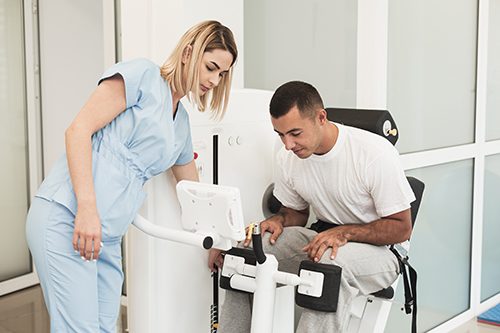Personal Support Workers (PSWs) play a vital role in Canada’s healthcare landscape, offering indispensable care and support to those in need. If you’re considering a career in this rewarding field, or simply curious about what it entails, you’ve come to the right place. This FAQ-style guide will highlight the intricacies of the role, delve into the required skills and education, explore job prospects, and shed light on the landscape for PSWs across Canada with a focus on the thriving Ontario sector.
What is a Personal Support Worker (PSW)?

Personal Support Workers are dedicated healthcare professionals trained to provide personalized care and assistance to individuals who require support with their daily activities. Their compassionate client-centered aid helps patients maintain their independence and quality of life. This can include tasks such as helping with personal hygiene, assisting with mobility, providing emotional support, and managing household tasks.
On a typical day, PSWs may assist clients with bathing, dressing, grooming, and personal care needs. They may also help with meal preparation, medication reminders, light housekeeping, and accompanying clients to appointments or social activities. The primary goal of any PSW is to assist patients in their care to live with as much freedom, comfort, and dignity.
What Essential Skills are Needed to Become a Successful PSW?

Becoming a successful PSW requires a unique blend of technical prowess, empathy, and interpersonal abilities. Some of the key skills include:
- Compassion and Empathy: PSWs must genuinely care about the well-being of their clients and be able to provide emotional support.
- Effective Communication: Clear and respectful communication is essential for building trust and understanding with clients, their families, and other healthcare professionals.
- Attention to Detail: PSWs must be thorough and observant, noticing changes in clients’ conditions and addressing their needs promptly.
- Patience and Resilience: Dealing with challenging situations and providing care with patience and resilience is crucial for maintaining quality support.
- Ability to Work Independently and in a Team: PSWs often work autonomously and collaborate with other healthcare professionals to ensure holistic care for clients.
- Basic Medical Knowledge: While not required to diagnose medical conditions, PSWs should have a foundational understanding of healthcare practices and protocols to provide safe and effective care.
What Education and Training are Required to Become a PSW?

Some specific educational requirements may vary on a provincial level, but most comprehensive programs prepare graduates to work across Canada. In Ontario, individuals aspiring to become PSWs typically complete a specialized training program, such as a Personal Support Worker Certificate. This program includes classroom instruction and hands-on clinical experience, covering personal care, safety procedures, communication skills, and ethical considerations.
Comprehensive PSW programs include courses on:
- PSW Foundations: Introduction to the role of a PSW, ethical considerations, and professional responsibilities.
- Safety and Mobility: Techniques for safely assisting clients with mobility, transferring, and positioning to prevent injuries.
- Body Systems: Basic understanding of human anatomy, common health conditions, and how they may impact clients’ daily lives.
- Assisting with Personal Hygiene: Proper techniques for helping clients with bathing, grooming, oral care, and toileting while respecting their dignity and privacy.
- Abuse and Neglect: Recognition of signs of abuse, neglect, and exploitation, along with protocols for reporting and addressing concerns.
- Household Management, Nutrition, and Hydration: Skills for maintaining a clean and safe environment, preparing nutritious meals, and promoting hydration.
- Care Planning, Restorative Care, and Working in the Community: Collaborating with healthcare teams, implementing care plans, and supporting clients in community settings.
- Assisting the Family / Growth and Development: Providing support to clients’ families and understanding the developmental stages across the lifespan.
- Assisting the Dying Person: Providing compassionate end-of-life care and supporting clients and their families through the dying process.
- Assisting with Medications: Understanding medication administration procedures, medicine safety, and documentation requirements.
- Cognitive / Mental Health Issues and Brain Injuries: Recognizing signs of cognitive impairment, mental health challenges, and strategies for providing support.
- Health Conditions: Understanding common health conditions, their symptoms, treatment options, and implications for care.
- Clinical Placements: Hands-on experience in facility and community settings under the supervision of experienced healthcare professionals.
What are the Career Opportunities Available for PSWs in Ontario?

When seeking employment opportunities after graduation, Ontario is one of the best provinces in Canada to find work. Graduates of PSW programs can explore a variety of specialized career opportunities in various healthcare settings. Some common career paths include:
- Personal Support Worker: Providing direct care and support to clients in homes, long-term care facilities, hospitals, and community settings.
- Nursing Assistant: Assisting registered nurses (RNs) and licensed practical nurses (LPNs) with patient care tasks in hospitals, clinics, and long-term care facilities.
- Caregiver / Companion: Providing companionship and assistance with daily activities for individuals living independently or with disabilities.
- Residential Care Aide: Supporting individuals with disabilities or chronic illnesses in residential care settings.
- Health Care Attendant: Assisting healthcare teams with patient care tasks and maintaining a safe and hygienic environment in hospitals and long-term care facilities.
What is the Expected Salary Range for PSWs in Ontario?
In addition to job opportunities being more plentiful, Ontario is typically on the higher end of the pay scale for PSWs. As in every career, salary can vary depending on experience, location, and employer. On average, PSWs in Ontario can expect to earn around $58,230 annually ($28/hr). However, salaries may be higher for those with specialized skills or working in specific healthcare sectors.
Conclusion
Becoming a Personal Support Worker offers a fulfilling career path with opportunities to make a meaningful difference in the lives of others. By acquiring the necessary skills, completing comprehensive training programs, and embracing the values of compassion and empathy, aspiring PSWs can embark on a journey that not only enriches their own lives but also positively impacts the communities they serve. Whether you’re drawn to the field out of a passion for helping others or a desire for personal growth, the role of a PSW offers endless opportunities for learning, development, and professional fulfillment.
If you’re interested in pursuing a challenging and rewarding career as a Personal Support Worker, please don’t hesitate to get in touch with one of our helpful admission advisors. Or you can check out more exciting industry blogs right here!
About The Author

Content Editor & Writer, ABM College
As Content Editor at ABM College in Calgary, Alberta, Stephen plays a key role in advancing the college’s mission to provide relevant, high-quality training for today’s job market. He ensures all blog articles and web materials are accurate, clear, and genuinely useful for students, career changers, and industry professionals.
Stephen is also the author of a best-selling historical reference series documenting decades of computer and video gaming history — a body of work recognized by the Canadian Choice Awards.
Connect with Stephen on LinkedIn, explore his published works at Falcon Designs, or see his editorial expertise in action on the ABM College Blog.
